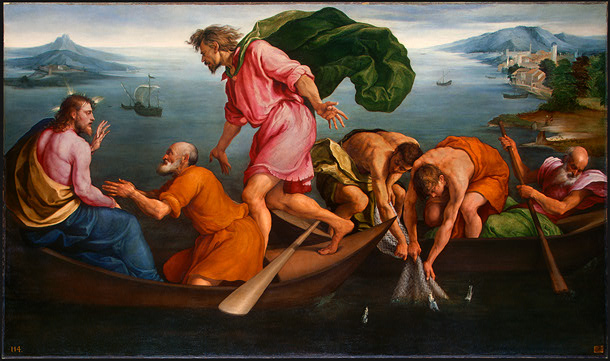One night during my first year of college, I was riding with some fellow believers, all from the same InterVarsity group at Willamette University, and we were talking about the megachurch we attended. Willamette is a secular liberal arts school (its historical connection to Methodism is now purely notional). It's the oldest on the left coast, and has the ivy of the Ivy League without the pedigree. It is not the preserve of the wealthy, necessarily, but let's just say I was only there because of a scholarship. And, at that time, Willamette had little interaction with the surrounding community of Salem, Oregon.
The megachurch we all attended had a dynamic preacher and up-tempo music. It was known as a relatively wealthy church, the cars in the parking lots being a major indicator. Because of its youth group and extensive children's ministry, it was also the place in town for families, especially white ones.
My friends and I went there for the preacher, who was smart, likable, and passionate. But the wealth of the congregation, or maybe the display of it, was somewhat embarrassing. And the music was irritating. In all, my friends in the car were conflicted about the church, frustrated with it.
At last, one guy said, "It's just so middle class!" The rest laughed bitterly.
I was taken aback by the hostility in his voice, and by the others' identification with it. Even though I felt the same frustrations with that church as the others, I couldn't understand the contempt they were expressing for being bourgeois. It hadn't occurred to me to think of myself as having risen beyond my origins. My thought was, "All of you are middle class."
In that year of 1989, there wasn't a name for young evangelicals who went to liberal arts schools, took books, cinema, and ideas seriously, and explored such exotica as liberation theology. There wasn't a name for graduates who followed their passion for the poor into work with Habitat For Humanity. There wasn't enough momentum for politically liberal evangelicals at the start of Reagan's third term to gain a label. Nor was the suburban megachurch the object of scorn that it is now.
But today my friends would be called emergents.
I have spent time on this blog exploring the barren flats of evangelical populism. Now it is time to take a look at the swamp of evangelical intellectualism.
I should be clear about my use of the term. I'm not using intellectual as a synonym for scholar. A scholar is removed from ordinary life and work to pursue an academic discipline. An intellectual is not so much removed from ordinary life as disaffected from it. He is embittered by the lives other people lead, contemptuous of their lack of sophistication, and resentful of their lack of attention to his accomplishments. The intellectual class sees itself as society's critic, wrote Robert Bork in 1996 (Slouching Toward Gomorrah, p 83):
Its members are generally critical of, if not actively hostile to, bourgeois society and culture. They are, moreover, susceptible to utopian fantasies.
Not all farmers are populists. So, too, not all scholars are intellectuals in the sense I am describing. And, truth be told, very few intellectuals are scholars. Most are merely glib with general knowledge.
Think Al Gore. Tortured, complicated, afflicted by a sensitive conscience -- and proud of all three. He is not trained deeply in any academic field. He studies science not for knowledge but for advocacy. His career trajectory is typical of an intellectual: liberal arts training, journalism, politics. His intellectualism, at least in many people's eyes, redeems him from grubbiness. He's more than an advocate, more than a politician, because he's about ideas.
Some of intellectualism's cultural characteristics:
1. Urban, not rural.
2. Scornful of business and money. Money is corrupt, and the businesspeople who pursue it are all animated by greed -- all of them.
3. Contemptuous of patrimony. Wherever an intellectual came from, whatever class or location or religion, that is the seat of hypocrisy and sick living.
4. Patronizing toward the middle class. All those poor, narrow people who just work, work, work in their office cubicles and then go to Applebees, all those parents with massive strollers and screaming children, who've never even met a poor person, who've never gone to Guatemala, who only care about money and their 401Ks and the prohibitive cost of filling their SUVs ...
5. Able to evoke positive emotions only with abstractions. Obama.
I see all of these characteristics among emergents. Now, the emergent phenomenon is about many things -- theology, history, abuse by authority figures. Emergents target many legitimate evils: consumerism, a mistaken identification of Christ with the Republican party, the neglect of the arts. Many stories are coming together to make the emergent stream. But it's intellectualism that I am finding over and over again. Many emergents are about class.
Here's a funny thing. Both evangelical populism and intellectualism, even though they have the opposite cultural characteristics, lead us to the same place: grievance. I doubt that resentment is going to advance the Kingdom of Christ, whether it comes from self-satisfied middle class Americans or self-hating middle class Americans. So why do so many evangelicals seem to seethe with it?
My friend's outburst that night in 1989 showed me early signs of the splintering of evangelicalism, and nearly twenty years later I'm still trying to figure out what it means.



